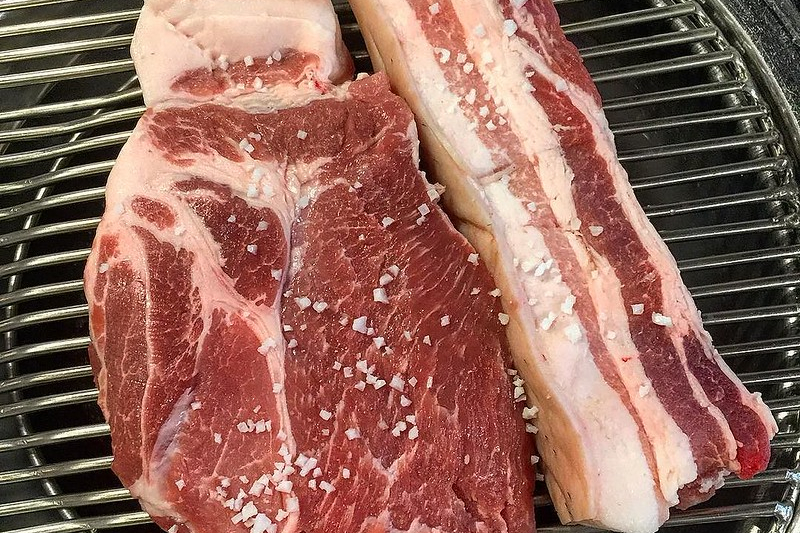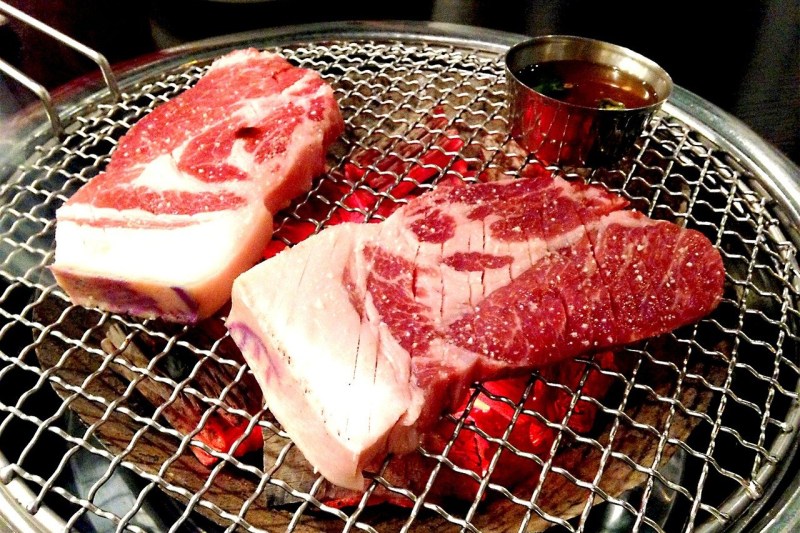Although famous for fermented kimchi and rich stews, Korean cuisine also prides itself on a unique meat product — Jeju black pig. This black-haired breed of pig hails from Jeju island, an island off the southern tip of the Korean peninsula. One of the most prized foods in Korea and often described as the wagyu beef of pork, Jeju black pig is leagues above standard pork. In Jeju, it’s common to find tourists from all over Korea who’ve traveled to the island specifically for this legendary pork.
Here to help The Manual understand why this pork is so prized is Chef Andrew Lim of Perilla, a modern Korean barbecue restaurant in Chicago.

Related Guides
What is Jeju Black Pig?
Koreans are extremely proud of their regional foods. Each region of Korea is famous for specialties ranging from cold noodles to eel barbecue. For Koreans traveling to Jeju, no trip is complete without a meal of Jeju black pig. This breed of pig originated in Manchuria about 2,000 to 3,000 years ago. Jeju black pig has been carefully documented and bred since the 1400s in Korea,
What makes Jeju black pig unique is its combination of color, taste, and texture. First, the color of this pork is very red, with an almost beef-like appearance and a far cry from the soft pink of standard pork. The taste of Jeju black pig is also very meaty, with a steak-like flavor. In general, most pork has a gaminess to the meat, but with Jeju black pig, that funk is nonexistent without sacrificing any of the rich fat prized in pork. But the most unique element of Jeju black pig might be its “chewy” texture.
“The texture of that first bite of “hook dweji” (black pig) off of the grill is what I fell in love with,” said Chef Andrew Lim. “It has a chewiness and snap about it, much like that signature snap you’d get from an all-beef Vienna frank at an old hot dog shop in Chicago.” It’s this textural combination of a meaty chew with soft, rich fat that makes Jeju black pig a travel-worthy treat for many Koreans.
Preparing Jeju Black Pig

The most popular way of cooking Jeju black pig is on the barbecue. Unlike American barbecue, Korean barbecue isn’t slow-smoked. Rather, cuts of meat are grilled over direct heat (charcoal, gas, or sometimes hay) table-side and served with various side dishes and sauces.
Cuts from Jeju black pigs are served very thick, with shoulder, collar, and belly being the preferred pieces. Koreans prefer pork with a healthy mix of fat and meat. The best cut to satisfy this ideal is pork belly, called samgyupsal (SAM-gyup-sal) in Korean. Breaking down the word, sam means the number 3, a direct description of the layers of meat to fat on a cut of pork belly. However, according to Lim, since the layers of fat and meat on Jeju black pig is considered superior, Jeju pork belly is called OH gyup sal (OH is the number 5).
Diners at Jeju black pig restaurants should expect thick slabs of pork placed whole on the grill. After a few minutes of grilling, these thick pieces will be cut into bite-sized chunks with scissors (an essential part of Korean barbecue). In Jeju island, there’s a unique sauce that’s served with black pig — myeolchi-jeot, a pungently salty anchovy-based dipping sauce. This sauce is commonly served in a small metal bowl and placed directly on the edge of the grill to keep warm. Other common seasonings include plates of thinly sliced marinated scallions and good-quality dipping salt.



